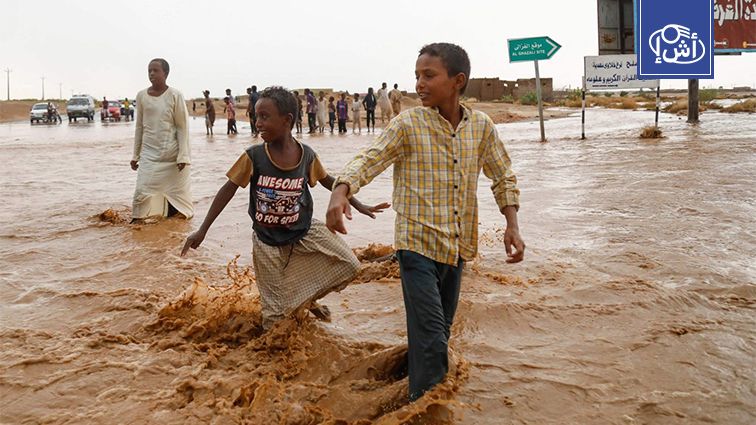Several areas in northern Sudan witnessed massive floods on Tuesday, completely and partially destroying more than 10,000 homes.
The intensity of the rains and floods was particularly severe in areas north of Dongola city, as well as in Abu Hamad city in River Nile State, a major center for gold mining activities in the country.
This situation has raised major environmental concerns due to the mixing of flo od waters with waste from mining sites and their sweeping into the Nile River, the main source of drinking water and irrigation for agricultural projects.
Although no official data has been issued on the extent of the losses, activists indicated that at least 10 people were killed and about 50 others were injured as a result of buildings collapsing or drowning in the floodwater.
According to preliminary estimates, more than 10,000 families in Abu Hamad city and surrounding areas have lost their shelter amid dire humanitarian and health conditions and a severe shortage of hospitals, medicines and potable water.
Mohammed Osman, a volunteer activist in the area, said that thousands of children and elderly people are living in the open and are exposed to bites from poisonous insects and disease vectors amid a severe shortage of medical services.
Othman explained in press statements that “the situation is very tragic, and everyone is in a state of panic after being surprised by floods and rains in light of the already poor humanitarian and economic conditions.”
Environmental experts have warned that the mixing of harmful mining waste with water could lead to major health and environmental disasters in light of the fragility of the health and environmental sectors in the country due to the war that has been going on for about a year and a half.
Hanan Muddathir, a consultant for environmental, water and sustainable development systems, pointed out that the Abu Hamad area is witnessing large mining activities that use materials that are harmful to the environment.
She said that “the floods lead to the waste being washed into waterways and groundwater wells, which poses a real danger to human health.”
Concerns have increased with reports that flood waters have washed away huge amounts of gold waste stored in farms, homes and schools, as 99.9% of the rubble from which gold is extracted turns into waste, leading to the contamination of drinking and irrigation water with mercury, cyanide and other mining waste.
The African Development Agency’s meteorological service predicted that Sudan could see its highest rainfall this year, surpassing the floods of 1946.
Pollution and health risks… catastrophic environmental effects of war in Sudan
